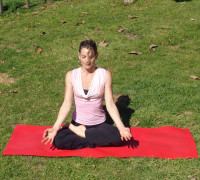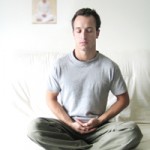by Kara-Leah Grant
I got a call from a journalist at the Waikato Times who wanted to interview me for an article on the ‘pros and cons’ of meditation.
I wasn’t sure if I could help her out – after all, I don’t teach meditation – however it turned out she wanted to interview me about my experience of awakening and psychosis.
Ah… I was to be the con in the article. Yes, meditation is dangerous, it can send you crazy!
I pondered whether to do it or not. I understand journalism and how most journalists work – I studied it at tertiary level and am a ‘qualified’ journalist. However, I was also dismayed, as an idealistic twenty year old, to discover how journalism really worked. See, we were taught to pick an angle on a story, and then write our article based on that angle.
In other words, you come up with the most controversial line of thought on a given topic, and then you find sources and material to fit that line of thought. We were making up stories. But that’s the nature of all media – even this article. Stories and narratives that we make up that shape our reality.
I knew that this reporter, despite saying the article would be ‘balanced’ was looking to share the ‘dangerous’ side of meditation and my story could easily fit this narrative. My story suggests that meditation can lead to psychosis – never mind the many other factors contributing to my experience, like psychological patterns of being (conflict avoidance, emotion avoidance and pollyanna thinking) emotional stress and recreational drug use, in particular, LSD.
However, the fact that a mainstream newspaper was running an article talking about enlightenment was a good thing.
It meant that a dialogue was opening up, and by choosing to be involved, I could shape that dialogue in some small way.
I found out the article had been published when I received an email from a concerned meditation teacher.
Reading your article on Kundalini awakening, I am sorry you had a bad experience.
Bad experience? Huh? See, I don’t think of my experience as ‘bad’. Yes, it was dramatic and awful, as I wrote in an earlier article about it – words the Waikato Times journalist quoted in her article. However, good/bad duality doesn’t really fit. My experience was extraordinary and I would never trade it for the world. It wasn’t bad – it led me to where I am now.
However, limited word space and a desire to push a particular angle means that when an article is written, the nuances of an experience are never fully fleshed out. And the article wasn’t about my experience per se, but about how meditation can be dangerous – look at this woman and how she ended up in the psych ward!
So can meditation be dangerous?
Hell yes – dangerous to your ego. Dangerous to your world view. Dangerous to your fixed sense of identity. Yes, yes and yes – dangerous all round!
Because, as the author reminds us, inner peace isn’t the aim of meditation – the aim of meditation is self-realization.
This is dangerous as all hell – to your mind and to your illusions and delusions about life.
Maybe you can no longer deny your relationship has been falling apart for years and you don’t know what to do about it.
Or that you hate your job but you have no idea what you really want to do.
Or that your consumer debt is ballooning on a weekly basis and you don’t know how to bring it under control.
Or that you are still grieving for a loved one that died last year and you don’t know how to proceed.
Meditation – the act of stopping and sitting still with whatever is arising within us – can have all kinds of dangerous implications. Because once you realise the truth about your relationship, or your job, or your debt, or your grief – then what do you do?
Now we have to feel something. Or do something. Or change something. Or realise something.
This is what makes meditation so dangerous. Nothing is the same ever again. We are never the same again.
Going through this change can be heart-wrenching and awful, difficult and long. (Or not. Sometimes it’s heart-affirming and delightful, easy and short).
I started meditating and my entire life imploded. As did my brain. Now look at me – living an integrated, aligned, heart-open, purposeful life. All because of meditation (and yoga, therapy, healing practices, good friends and family).
That’s dangerous man.
Especially because now I’m all integrated and aligned and heart-open, I am turning my attention back outward on the world. I’m seeing what’s going on, and where I might be of service.
Which is why I said yes to Nancy’s interview, even though I knew the article would end up offering a tiny pin-prick of perspective on a huge topic. Because I knew her article would get people thinking about meditation, talking about meditation, and wondering about enlightenment and psychosis and psych wards.
Nancy asks at the end of her article:
But like all multimillion-dollar industries, if it [meditation] worked for everyone, we would all be skinny, rich and powerful. What is the use of enlightenment if it puts you in hospital?
This is the use of meditation Nancy – me, as I am now.
Yes, I’ve been in a psych ward, but that was not the end of the world, or the end of my story. It was just the beginning.
Now I am an integrated, aligned human being living a heart-open purposeful life that brings much joy and light to many people (if I am to believe the emails and messages I get) – all thanks to meditation.
Meditation worked for me – because I know that ‘happiness’ and ‘joy’ do not come when we’re all skinny, rich and powerful. I know that happiness and joy are not dependent on external circumstances at all – that this is a myth we’re sold into at birth. I know that we don’t meditate to get something, we meditate to lose something – the idea that we are somebody, anybody at all.
Yes, I have been liberated.
And that is dangerous.


Thank you Kara-Leah for your candor and raw openness. Also, for sharing both of these articles. I have been on the fence about attending a Vipassana retreat soon – I am curious if you have ever been on a retreat like this and whether or not you would do it again if given the opportunity. Blessings!
Hey Laura,
I have never done Vipassana, but have many friends who have. My sister has been something like seven times! I would do it if I had the opportunity, absolutely.
However, I do also have know two people who have had strong experiences as a direct result of Vipassana. One had a spontaneous Kundalini Awakening, and the other was hallucinating and finding the boundaries of reality blurring. In both cases, the Vipassana staff weren’t able to offer them the support they required or needed, and were focused on encouraging them to stay with the practice even though it wasn’t what they needed. However, these were both extreme cases and are not necessarily indicative of all Vipassana centres or staff.
If you’re sitting on the fence, I would suggest contacting the Vipassana Centre you’re considering visiting and having a good talk to the staff. Share your concerns, see how they respond, feel them out.
Be mindful too of your own mental and emotional state – if you’re in a fragile place, or have a history of bi-polar, anxiety or depression, sometimes (but not always!) Vipassana can aggravate these conditions. Paradoxically, it can also help to soothe or ease anxiety or depression (I’m not sure about bi-polar).
Good luck!
Thank you for the swift and kind response. It was so very helpful!
You might find Willoughby Britton’s research work in this area of interest – see for e.g.:
http://www.theatlantic.com/health/archive/2014/06/the-dark-knight-of-the-souls/372766/
and http://cheetahhouse.org/
Meditation does have many benefits (I’m a long time practitioner myself) but there are risks too – and these are rarely presented to people due to the current way mindfulness meditation is being marketed by some as a panacea to everything.